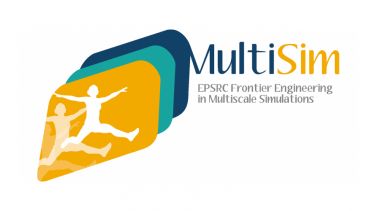University of Sheffield research into the modelling of the human musculoskeletal system to assist the assessment, diagnosis and treatment options for individual patients has received a second phase funding via the £750k Engineering and Physical Sciences Research Council (EPSRC) “Frontier Engineering: Progression Grant in Modelling complex and partially identified engineering problems. Application to the musculoskeletal system” (MultiSim2).
The MultiSim research project is a £6.7m EPSRC Frontier Engineering Award project, based at the University of Sheffield’s Insigneo Institute for in silico Medicine, which began in 2013. The project set out to develop a modelling framework focused on disorders of the human musculoskeletal system which will benefit the healthcare sector by improving the assessment, diagnosis and choice of treatment options for specific patients, ultimately improving their quality of life. The computational platform developed was successfully applied to the prediction of the risk of fracture in osteoporotic and osteopenic women, and to the pre-clinical investigation of bone remodelling in animal models to assess the effect of new treatments. MultiSim2 will be led by Professor Claudia Mazzà from the University’s Department of Mechanical Engineering and will continue the work of MultiSim while also expanding the focus to include modelling of the skeletal muscles to predict the effects of pathologies such as sarcopenia and neurodegenerative diseases.
MultiSim2 will develop new approaches for better imaging, characterisation and modelling of the muscles and of their interaction with the skeletal system drawing on expertise from academics across the Faculties of Engineering, Science, and Medicine, Dentistry and Health. Dr Enrico Dall’Ara, Senior Lecturer in Multiscale Musculoskeletal Imaging at the University’s Department of Oncology and Metabolism explained, “In our murine work, we will focus on developing non-invasive longitudinal imaging techniques and computational models to support the reduction and partial replacement of the use of mice in musculoskeletal research. The comprehensive assessment of changes in different musculoskeletal tissues (bone, muscles, tendons) over time in both patients and animals will allow us to create a combined experimental and computational framework to better understand and model the effect of diseases and to optimise future treatments.”
Commenting on MultiSim2’s aim to apply computational modelling to the investigation of Sarcopenia, Eugene McCloskey, Professor in Adult Bone Diseases in the Academic Unit of Bone Metabolism and Mellanby Centre for Bone Research and Director of the MRC-Arthritis Research UK Centre for Integrated Research in Musculoskeletal Ageing at the University of Sheffield, said, “Sarcopenia is the degenerative loss of skeletal muscle mass, quality, and strength associated with ageing and is present in around 5-10% of people over 65 years of age. Optimal care is still lacking but needed due to the high personal, social and economic burdens that this condition poses when untreated. It is currently overlooked and undertreated in mainstream practice and I am excited about the potential for new understanding of this condition including the identification of biomarkers to monitor interventions.”
Professor Claudia Mazzà, Interim Executive Director of the Insigneo Institute and Course Director of the MSc in Computational Medicine, commented, “I am very pleased that, besides continuing to foster our research, MultiSim2 will enable us to support training a new generation of adventurous and ambitious multidisciplinary researchers by fostering the cross-fertilisation stemming from mutual involvement in the development of the modelling frameworks for clinical and pre-clinical applications. MultiSim’s track record in promoting multi-scale modelling among young researchers through our Modelathon events is well established and we will continue to build on this with creative and collaborative activities.”



